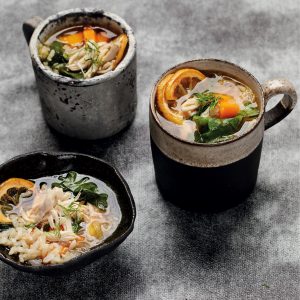Pregnancy and eating for two changes the way you look at food and your diet – as well as the rest of your life! Pontsho Sepoloane, a Pretoria-based dietitian and executive member of the Association for Dietetics in South Africa, wants to make sure it’s a healthy change.
By Lauren Shapiro
FROM A–Z
Supporting a growing fetus requires the right fuel. Eating a balanced diet will ensure Mom gets all the vitamins and minerals necessary for the healthy development of her baby.
Calcium is needed for growing bones and teeth. Go for dairy products such as milk, cheese, maas and yoghurt; and oily fish such as sardines and pilchards. (Vegans should up their intake of dark green leafy vegetables such as spinach and broccoli, calcium-fortified soy milk and almonds.)
Omega-3 fatty acids are critical for fetal brain, eye development, and can also prevent perinatal depression in the mother. Good sources are tuna, salmon and nuts (especially walnuts).
Folic acid is vital for pregnant women. Inadequate levels increase the risk of your baby being born with neural-tube defects such as spina bifida. Broccoli, brussels sprouts and cauliflower are all excellent sources of folate. You can also talk to your obstetrician about possible dietary supplements.
IRON WOMAN
During pregnancy, the amount of blood in a woman’s body goes up by as much as 50%, greatly increasing the body’s need for iron. This essential mineral is needed to produce extra red blood cells for the baby, and the placenta too. Foods rich in iron include liver, red meat, egg yolk, dried beans, wholewheat bread and fortified cereals.
ICE CREAM, PICKLES AND A SIDE OF ASH
Pregnant women sometimes develop cravings for specific foods. They are usually harmless quirks of pregnancy, but some studies suggest that cravings for non-food substances can indicate a deficiency. Strange things such as soil, ash or chalk may actually contain the calcium or iron your body is missing. Before you reach for the potting soil, discuss your cravings (or aversions to food) as well as your overall diet with your doctor.
SUPERSIZE ME
Of course, you are going to gain weight. The question is exactly how much. The appropriate weight gain for a woman with a normal pre-pregnancy weight is
11–15 kg (those who are overweight can expect to gain 6–11 kg).
BREAST IS BEST
Breast milk is nature’s perfect baby food, and breastfeeding women are encouraged to eat healthily in order to improve the nutrient content of their milk. The Department of Health recommends feeding your baby on breast milk alone, where possible. This is in line with World Health Organization guidelines. If you are unable to breastfeed, give your baby a good-quality formula to meet their nutritional needs. Cow’s milk is not suitable for children under the age of one.
CLEVER COMBO
For optimal iron absorption, combine iron-rich foods with those that are high in vitamin C (citrus, mangoes, tomatoes, red peppers and guavas). Avoid drinking tea and coffee when you eat iron-rich foods, as they prohibit absorption.
NO THANKS
1. Alcohol can interfere with the development of the baby’s brain and lead to miscarriage.
2. Caffeine can also increase the risk of miscarriage. Pregnant women should limit their intake to two cups of coffee (200 mg of caffeine) a day.
3. Raw eggs may carry salmonella, which can cause food poisoning for Mum, and risks for the baby.
4. Raw fish and seafood (such as sushi) can carry nasty parasites and bacteria. Thorough cooking kills most of these.
5. Blue cheese (and other soft, mould-ripened cheeses) can contain bacteria that cause listeriosis.
NOTE: Breastfeeding transfers all these risks to the infant too.




